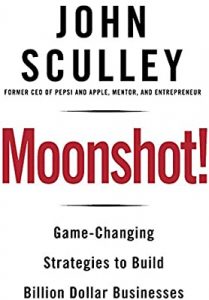
The key is to build a business that’s successful not just today but tomorrow as well. To do that, John Sculley suggests you should keep 3 things in mind :
1. The Power of Your Customer
We live in the age of the internet, which is getting bigger and faster by the years. This gives unlimited information at the fingertips of each customer and as we know, knowledge is power. Ultimate power.
2. People Want to be Users, not Owners
When the world changes, so do business models. Today, people perceive value in enjoying the benefits of a product without actually owning it. There are exceptions in many Asian countries where consumption is growing (this is also gradually changing depending on the product and market). Know your target market and what the customers want.
3. Create an Experience, Not just a Product
Caring for your customers is extremely essential. Do everything you can to keep them satisfied. Customers favour low prices, fast delivery, or the feeling of being special.
# Key Takeaways:
– The importance of setting ambitious goals and having a clear vision for success
– The power of collaboration and diversity in achieving moonshot goals
– The need for continuous learning and experimentation in order to innovate and make breakthroughs
– The role of failure in the process of achieving moonshots and how to embrace it as a learning opportunity
– The importance of having a growth mindset and being open to new ideas and perspectives
# Practical Application:
The concepts and strategies presented in Moonshot can be practically applied in real-world scenarios by:
– Setting ambitious goals and creating a clear roadmap to achieve them
– Encouraging diversity and collaboration within teams to foster creativity and innovation
– Creating a culture of continuous learning and experimentation, where failure is seen as a stepping stone towards success
– Adopting a growth mindset and being open to new ideas and perspectives, both within the organization and in the industry as a whole
# Valuable Insights for Leaders and Managers:
– Chapter 1: “The Power of Moonshots”
– provides a comprehensive understanding of what moonshots are and why they are important for organizations and leaders.
– Chapter 3: “The Moonshot Mindset”
– explores the mindset and characteristics of successful moonshot thinkers and leaders.
– Chapter 5: “The Moonshot Team”
– discusses the importance of diversity and collaboration in achieving moonshot goals.
– Chapter 7: “The Moonshot Culture”
– highlights the role of culture in fostering innovation and embracing failure.
# Case Studies and Examples:
– Google’s self-driving car project
– showcases the power of moonshot thinking and how it can lead to groundbreaking innovations.
– The Apollo 11 moon landing
– a classic example of a successful moonshot goal and the importance of collaboration and perseverance in achieving it.
– The failure of Google Glass
– illustrates the importance of learning from failure and continuously iterating to improve and achieve success.
Leave a Reply